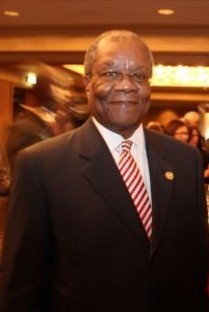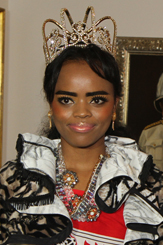
Eswatini, officially the Kingdom of Eswatini and formerly named Swaziland, is a landlocked country in Southern Africa. It is bordered by Mozambique to its northeast and South Africa to its north, west, south, and southeast. At no more than 200 kilometres (120 mi) north to south and 130 kilometres (81 mi) east to west, Eswatini is one of the smallest countries in Africa; despite this, its climate and topography are diverse, ranging from a cool and mountainous highveld to a hot and dry lowveld.

Eswatini is an absolute monarchy with constitutional provisions and Swazi law and Custom. The head of state is the king or Ngwenyama, currently King Mswati III, who ascended to the throne in 1986 after the death of his father King Sobhuza II in 1982 and a period of regency. According to the constitution of Eswatini, the king and Ingwenyama is a symbol of unity and the eternity of the Swazi nation. By tradition, the king reigns along with his mother or a ritual substitute, the Ndlovukati. The former was viewed as the administrative head of state and the latter as a spiritual and national head of state, with real power counterbalancing that of the king, but during the long reign of Sobhuza II the role of the Ndlovukati became more symbolic. The king appoints the prime minister from the legislature and also appoints a minority of legislators to both chambers of Libandla (parliament), with help from an advisory council. The king is allowed by the constitution to appoint some members to parliament for special interests. These special interests are citizens who might have been left out by the electorate during the course of elections or did not enter as candidates. This is done to balance views in parliament. Special interests could be people of gender, race, disability, business community, civic society, scholars, chiefs and so on. The Senate consists of 30 members, of which some are appointed by the king on recommendation of the advisory council and others elected by the lower house. The House of Assembly has 65 seats, 55 of which are occupied by elected representatives from the 55 constituencies around the country, and 10 of which are appointed by the king on recommendation of the advisory council; the attorney general is the ex-officio member. Elections are held every five years.
The Umbutfo Eswatini Defence Force (UEDF) is the official armed national military of the Southern African Kingdom of Eswatini (Swaziland). It is used primarily during domestic protests, with some border and customs duties; the force has never been involved in a foreign conflict. The army has struggled with high rates of HIV infection. Since measures were put in place the rate is dropping.

Artifacts indicating human activity dating back to the early Stone Age have been found in the Kingdom of Eswatini. The earliest known inhabitants of the region were Khoisan hunter-gatherers. Later, the population became predominantly Nguni during and after the great Bantu migrations. People speaking languages ancestral to the current Sotho and Nguni languages began settling no later than the 11th century. The country now derives its name from a later king named Mswati II. Mswati II was the greatest of the fighting kings of Eswatini, and he greatly extended the area of the country to twice its current size. The people of Eswatini largely belong to a number of clans that can be categorized as Emakhandzambili, Bemdzabu, and Emafikamuva, depending on when and how they settled in Eswatini.

Mswati III is the king of Eswatini and head of the Swazi royal family. He was born in Manzini in the Protectorate of Swaziland to King Sobhuza II and one of his younger wives, Ntfombi Tfwala. He was crowned as Mswati III, Ingwenyama and King of Swaziland, on 25 April 1986 at the age of 18, thus becoming the youngest ruling monarch in the world at that time. Together with his mother, Ntfombi Tfwala, now Queen Mother (Ndlovukati), he rules the country as an absolute monarch. Mswati III is known for his practice of polygamy and currently has 15 wives.

The Swazi or Swati are a Bantu ethnic group in Southern Africa, inhabiting Eswatini, a sovereign kingdom in Southern Africa. EmaSwati are part of the Nguni-language speaking peoples whose origins can be traced through archaeology to East Africa where similar traditions, beliefs and cultural practices are found.

Sobhuza II, was the Paramount Chief and later Ngwenyama of Swaziland for 82 years and 254 days, the longest verifiable reign of any monarch in recorded history. Sobhuza was born on 22 July 1899 at Zombodze Royal Residence, the son of Inkhosikati Lomawa Ndwandwe and King Ngwane V. When he was only four months old, his father died suddenly while dancing incwala. Sobhuza was chosen king soon after that and his grandmother Labotsibeni and his uncle Prince Malunge led the Swazi nation until his maturity in 1921. Sobhuza led Swaziland through independence until his death in 1982. He was succeeded by Mswati III, his young son with Inkhosikati Ntfombi Tfwala, who was crowned in 1986.

The People's United Democratic Movement is the largest opposition party in Eswatini. It is a democratic socialist party. Formed in 1983 at the University of Eswatini, it is led by Mlungisi Makhanya. The Swazi government has been monitoring PUDEMO closely since it launched the Ulibambe Lingashoni campaign, which aims for a "total liberation" of Eswatini, and has recently cracked down heavily on even small manifestations of support for PUDEMO, such as the death in custody of PUDEMO member Sipho Jele, who was arrested for wearing a PUDEMO t-shirt in May 2010.
Lobamba is a city in Eswatini, and is one of the two capitals, serving as the legislative, traditional, spiritual, seat of government of the Parliament of Eswatini, and Ludzidzini Royal Village, the residence of Queen Ntfombi, the Queen Mother.

Prince Barnabas Sibusiso Dlamini was a Swazi politician who served as Prime Minister of Eswatini, from 1996 to 2003 and again from October 2008 to September 2018.
Dr. Moses Mathendele Dlamini is a Swazi political figure. He was a Senator and is acting chief of Mbelebeleni in the Shiselweni District. He was also Swaziland's Minister of Foreign Affairs and Trade from 2006 to 2008. Since October 2008 he has been serving in king Mswati III's advisory council or Swaziland national council standing committee(Liqoqo supreme council).

The House of Dlamini is the royal house of the Kingdom of Eswatini. Mswati III, as king and Ngwenyama of Eswatini, is the current head of the house of Dlamini. Swazi kings up to the present day are referred to as Ingwenyama and they rule together with the Queen Mother who is called Indlovukati. The Swazi kings, like other Nguni nations, practice polygamy and thus have many wives and children.

Princess Sikhanyiso Dlamini is a Swazi princess and politician. She is the eldest daughter of King Mswati III of Eswatini, and is the country's current Minister of Information and Communication Technology.
Constance Simelane is a Eswatini politician who rose to become the first female Deputy Prime Minister of the Kingdom of Swaziland. Appointed to the Senate in 2001, Simelane became Minister of Education in 2003. In October 2006 Simelane was appointed Deputy Prime Minister by King Mswati III, succeeding Albert Shabangu who had died a month earlier.
Dlamini is a surname, common in Eswatini and neighbouring parts of South Africa. People with the surname Dlamini include:

Themba Nhlanganiso Masuku is a Swazi politician who has served as Deputy Prime Minister of Eswatini since 2018 and as Acting Prime Minister from 13 December 2020 to 16 July 2021. Earlier, he served as Deputy Prime Minister from 2008 until 2013.

Tsandzile Dlamini is a princess of Eswatini who currently serves as Minister of Home Affairs.

Government of the Kingdom of Eswatini is the union government created by the constitution of Eswatini where the monarch holds supreme executive, legislative, and judicial powers. The Ngwenyama (lion) is a hereditary leader, rules the country, with the assistance of a council of ministers and a national legislature.
A series of ongoing protests in Eswatini against the monarchy and for democratisation began in late June 2021. Starting as a peaceful protest on 20 June, they escalated after 25 June into violence and looting over the weekend as the government took a hardline stance against the demonstrations and prohibited the delivery of petitions.










